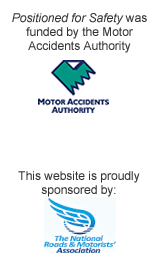Public Policy
NSW Motorcycle Consultative Committee
Until recently, the NSW Government consulted with motorcyclists through the NSW Motorcycle Consultative Committee, which met every 6 months. The Committee was chaired by the RTA and membership was limited to the MCC, MTA (Motor Traders Association) and the FCAI (Federal Chamber of Automotive Industries). A representative of the Minister for Roads was invited to attend.
This forum has been in place for over ten years but in 2005, the MCC withdrew from the committee. This was after a series of events indicated a lack of willingness by RTA management to engage with riders in meaningful consultations as a part of the policy development process.
In 2007 it was proposed to establish a Ministerial Advisory Committee on Motorcycling. The purpose being to provide the Minister for Roads with strategic policy and program advice on motorcycling matters in relation to safety, roads management and transport policy.
Motorcycle Safety Campaigns
Road safety campaigns aimed at improving road user behaviour, focus on the State road safety priorities of alcohol, speed and fatigue in addition to specific campaigns to improve pedestrian and pedal cycle safety.
Until recently the only NSW campaigns specifically designed for motorcycle safety have been developed and funded by motorcyclists through their voluntary organisations. However since the release of Positioned for Safety in 2002, a number of motorcycle awareness campaigns have been initiated by Local and State government organisations.
There is ample evidence that motorcyclists are well aware of the risks which, with some justice, they attribute to other drivers and road condition. It is also apparent that many motorcyclists are actively involved in ensuring their own safety through post license training, protective clothing and search for safety information. Through organising Motorcycle Awareness Week, making their own advertisements for television and funding their own research into roadside furniture, NSW riders have clearly taken responsibility for their own safety.
It is this high level of commitment to motorcycling that appears to confound road safety professionals, who assess the risks without taking account of the intrinsic benefits which motivate motorcyclists. For road safety authorities it seems the choice of motorcycles as a form of transport indicates an irresponsible attitude to risk that needs to be controlled and discouraged. The focus on rider behaviour as the sole option for countermeasures has resulted in riders becoming increasingly defensive and reluctant to acknowledge their own contribution to crashes. The consequences has been to marginalise motorcyclists in the safety debate and discount their views in the development of countermeasures.
The level of commitment provides an opportunity for road safety authorities to work with motorcyclists to address safety issues. However, such initiatives would require some reconciliation and acceptance of different views and cultures of risk. More open communication and consultation, supported by relevant research will be required to overcome the past and establish relationships based on respect and trust.
Regulatory status of motorcycles
A key to many of the problems faced by motorcyclists appears to be their lack of separate status as road users under the law. Motorcycles are generally classed and treated within the same framework as cars. This approach fails to recognize their particular characteristics and requirements as vulnerable road users. Having no separate category is also likely to be a factor in their general invisibility in road design, transport planning and provision of facilities as well as in the development of road safety behavioural campaigns. There is perhaps some irony that while road authorities spend many millions on facilities to encourage and protect pedestrians and pedal cyclists, little is spent on the only one of the vulnerable road users who actually pays road tax.
The failure to recognize motorcycles as a separate and distinct class of road users has also resulted in an inequitable position for motorcyclists. Motorcycles are charged the same tolls for road use as cars under NSW legislation, despite their substantially lower impact upon road maintenance costs. This is in contrast to the justification of weight tax for trucks based upon increased road maintenance.
There are other significant inconsistencies as to how different road user classes are handled within the regulatory environment. Pedal cycles are defined as vehicles and their riders as drivers under the Roads Act, 1993, they are accommodated in the planning of all new roads but are not subject to registration or toll charges.
Regulatory control on motorcycle vehicle noise is another significant area of policy that is of concern for motorcyclists. While not advocating excessively noisy machines, a certain level of noise is regarded as a safety feature by many motorcyclists. The unique sound of a motorcycle can draw the attention of otherwise oblivious road users, this is particularly important in congested city areas where pedestrians are more likely to step into the path of motorcycles. The plea of motorcyclists for recognition of the value of audible conspicuity is often confused by non-motorcyclists with the small number of excessively noisy machines which do exist and which give a poor public image to all motorcyclists.

